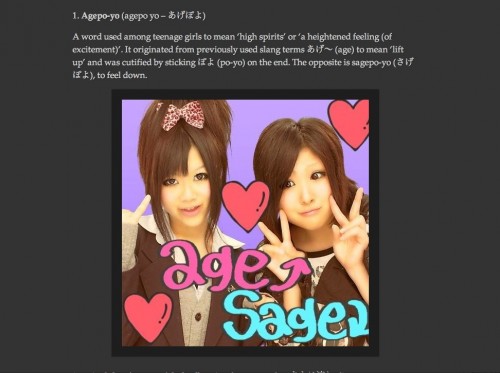The year is coming to an end with a sigh and hopefully not with a bang. Well, hopefully not a bang in the bad kind of things exploding, terrible tragedy bang sort of way.We already had enough bangs this year 3/11 and 3/15. Earthquakes and nuclear meltdowns. My oh my. But amidst the disaster, Japanese culture survived and thrived. This year’s buzzwords include the suggestive “love injection.” For those of us who have spent too much time in seedy places, the word conjures to mind the word: “love juices” aka 愛液 (aieki) the viscous liquid women secrete during pleasurable sexual intercourse which increases lubrication and sexual enjoyment. (There is apparently some debate as to whether 愛液 really exists or not, but those who know don’t really need to argue over it. It’s like the Tao in that sense.) Let’s move on, because while 愛液 may be related to buzzing, it is not one of the buzzwords this year.
My personal favorite buzzword of the year was 想定外 (soteigai) which literally means, “outside what we could conceive” or “unforeseeable.” It was used often by Tokyo Electric Power Company (TEPCO) to explain their failure to prevent a triple nuclear meltdown. We hear the word less from the TEPCO flacks as it turns out that for years they were aware that a large earthquake could cause critical damage to the plant and a plant and that a tsunami might wipe out their electrical systems and back-up systems for dealing with damage to the nuclear reactors. Perhaps, 想定外 in the TEPCO play books means this, “We don’t foresee anyone holding us accountable for our criminal negligence.” They may be right. I’m using it as my excuse for anything poorly planned, for example, when ordering Christmas gifts from Amazon the day before Christmas. “Gee kids, I don’t know why that Lego set didn’t arrive. 想定外ですね”
Gakuranman, has an encyclopedic feature on the 60 buzzwords for the year, including 超可愛い (super-cute) photos. Click on these happy (ageopoyo) girls for the feature. 
For the top ten buzzwords, Sandra Barron, of the Japan Times Japan Pulse, has a great article. Here’s an excerpt.
The news in Japan in 2011 was dominated by the March 11 earthquake and tsunami that devastated much of the Tohoku region (and proved the worth of Tokyo’s earthquake-resistant architecture). It’s only natural that words related to the disaster and its aftermath made up a good portion of the top buzzwords of the year as chosen by Jiyu Kokuminsha, publishers of an annual book of new and newly important words. However, the mundane and the downright silly mix with the serious in this list, whittled down from an initial 60 nominees, as life did go on for most of Japan, albeit with a new sense of gravity. In descending order, here are the top 10 buzz phrases of 2011 in Japan.
Grand prize-winner: Nadeshiko Japan (なでしこジャパン Nadeshiko Japan): This name for Japan’s women soccer team actually made it into the 2004 list of buzzword nominees, but it was the team’s amazing and inspiring victory at this year’s World Cup that brought them into the lexicon. Even the losing U.S. side was moved by the down-to-the-wire win just three months after the quake. Nadeshiko Japan was the first sports team to receive the People’s Honor Award from Prime Minister at the time, Naoto Kan, for the “fighting spirit” they showed against a better-ranked team and the joy they brought the country with their victory. It’s worth noting that the phrase “yamato nadeshiko” conjures up images of self-sacrificing wives of soldiers, and appropriately, Team Japan really did have to hold down days jobs while working to become the No. 1 team.
And the rest …
Bonds (絆 kizuna): Refers to efforts to reach out from within Japan to the devastated areas and to international efforts to reach out to Japan. Among other uses, it appeared as the title of a charity bookto aid survivors and the slogan for the rebuilding of damaged train lines in the area.
Smart phone (スマホ sumaho): With dozens of international and homegrown models to choose from, more Japanese consumers than ever gave up their keitai for touchscreens. The buzz undoubtably began as DoCoMo unveiled new smart phones in February, and 4S iPhone mania hit peak levels in the fall. And this week, Toyota kicked it up a notch by showing off the Fun-vii, a prototype car dubbed ”a smartphone on four wheels.”
Loach cabinet (どじょう内閣 dojou naikaku): The Japanese media’s nickname for the cabinet appointed by new Prime Minister Yoshihiko Noda in September. The incoming PM attempted to set a tone of low-profile hard work for his administration by good-naturedly invoking an image from a poem by Mitsuo Aida: “A loach does not have to emulate a goldfish.”
“How ya like me now” face (どや顔 doyagao): That’s our translation of the excessively self-satisfied facial expression that was named by Kansai comedians a few years ago and then popularized this year. Japanese goalkeeper Eiji Kawashima was praised for his fierce doyagao, people uploaded videos of their own smug mugs, and there was even a TV special, the “Oh! Doyagao Summit“, devoted to the look.
Stranded commuters (帰宅難民 kitaku nanmin): This word for “people who have difficulty returning home” came up twice this year: Once when commuters were stranded by stopped trains on March 11, and again on the evening of Sept. 21, when typhoon Roke stopped trains for thousands of commuters just at rush hour —and destroyed their umbrellas, to boot.
Kodama deshou ka/Is it an echo? (こだまでしょうか kodama deshouka): The end of a poem played as a public service announcement by the Ad Council of Japan, one of several PSAs played incessantly after 3/11 in place of commercials. While the poem’s message — people respond kindly when they are treated kindly — was meant to reverberate in people’s hearts, it was the tune and the rather grating “AC” chime at the end that echoed in people’s heads.